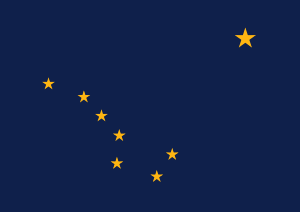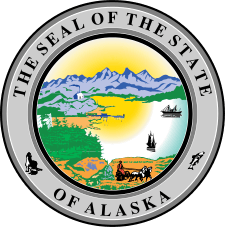Alaskan Independence Party
Alaskan Independence Party | |
|---|---|
 | |
| Abbreviation | AIP |
| Chairperson | Lynette Clark |
| Founded | June 14, 1984[1] |
| Ideology |
Alaskan nationalism Right-libertarianism Paleoconservatism |
| Political position | Right-wing |
| International affiliation | None |
| Colors | Blue and Gold |
| Seats in Senate |
0 / 20 |
| Seats in House |
0 / 40 |
| Website | |
|
www | |
The Alaskan Independence Party (AIP) is a political party and independence movement in the U.S. state of Alaska that advocates an in-state referendum which includes the option of Alaska becoming an independent country. The party also advocates positions similar to those of the Constitution Party, Republican Party and Libertarian Party, supporting gun rights, privatization, home schooling, and limited government.
The National Constitution Party has listed the AIP as an Alaska affiliate in the past, but no longer does so.[2]
History
The Alaskan Independence Party was originally founded with the goal of obtaining for Alaskans the right to vote on statehood. Referring to Alaska's 1959 admission to the union, the AIP charter states: "The Alaskan Independence Party's goal is the vote we were entitled to in 1958, one choice from among the following four choices:
- Remain a territory.
- Become a separate and independent country.
- Accept commonwealth status.
- Become a state.
The call for this vote is in furtherance of the dream of the Alaskan Independence Party's founding father, Joe Vogler, which was for Alaskans to achieve independence under a minimal government, fully responsive to the people, promoting a peaceful and lawful means of resolving differences."[3]
Since its founding, the AIP has radically changed with respect to the issue of secession. At present, it does not support secession though, at its founding, it did. In 1973 Joe Vogler began arguing about the validity of the Alaskan statehood vote. Early in that year, he began circulating a petition seeking support for secession of Alaska from the United States. Alaska magazine published a piece at that time in which Vogler claimed to have gathered 15,000 signatures in three weeks.
Vogler has been quoted as stating "I'm an Alaskan, not an American. I've got no use for America or her damned institutions."[4][5]
In early 1973, Vogler founded Alaskans For Independence, originally to label the petition drive. The organization took on a life of its own in the following years, and actively pursued secession for Alaska from the United States. Vogler also founded the Alaskan Independence Party at around the same time. During its first decade of existence, the Party was used exclusively by Vogler for his first two campaigns for governor and campaign for lieutenant governor (with Don Wright as his running mate). Largely in response to the lawsuit Vogler v. Miller, the State of Alaska enacted emergency regulations, effective June 14, 1984, which gave official recognition to the party in Alaska. The party has maintained its recognized status since, first by maintaining thresholds in gubernatorial elections, then through same with voter registration.[1] The AIP, while a home to many secession-minded people, has from the start sought to explore whether the 1958 vote by Alaskans authorizing statehood was legal, as outlined in the excerpt from the party's charter found above.
Vogler would serve as the AIP's standard-bearer for most of the party's first two decades. He ran for governor in 1974, with Wayne Peppler as his running mate.[6] Jay Hammond was elected over incumbent governor William Egan, with Vogler trailing far behind. Typical political discussion of the day included the contention that Vogler was a "spoiler," and that the result would have been different had he not been in the race, however Vogler ran on a conservative platform and perhaps if he hadn't run the margin of victory would have been larger for Republican Hammond.
Vogler's running mate in 1986 was Al Rowe, a Fairbanks resident and former Alaska State Trooper. Rowe took out a series of newspaper ads, fashioning himself in the image of Sheriff Buford Pusser. These ads were a major attention getter during the race. Between Rowe's ads and the turmoil existing in the Republican Party over the nomination of Arliss Sturgulewski, the AIP gained 5.2 percent of the vote, becoming a recognized party in Alaska for the first time.
Since then, AIP candidates have disapproved of initiating a statewide vote revisiting the status of Alaskan statehood. In 1990, former Republican governor Walter Joseph Hickel won the election for governor as a member of the Alaskan Independence Party, with Jack Coghill as his running mate. This is the only time since Alaska joined the union that a third-party candidate has been elected governor. Hickel refused a vote on secession called on by a fringe group within the AIP loyal to Vogler's original vision. He rejoined the Republican Party in 1994, with eight months remaining in his term.
Carl E. Moses, a businessman from Unalaska who had served in the Alaska House of Representatives from 1965–1973 as both a Republican and Democrat, was elected again to the House in 1992, running under the AIP banner. He was elected to a district comprising mostly the area between the Aleutian Islands and Bristol Bay. He switched his party affiliation back to Democrat at around the same time that Hickel switched, and continued to serve in the House until 2007.
The party did not get involved in presidential elections until 1992, when it endorsed Howard Phillips, the candidate of the U.S. Taxpayers Party (now the Constitution Party).
Registered members
As of May 2009 the party had 13,119 registered members, making it the state's third largest; the Republicans had 124,892 members and the Democrats had 75,047.[7]
On September 2, 2008, reports surfaced that according to the Alaska Division of Elections Todd Palin, husband of then-Governor Sarah Palin (a Republican), had registered as a member of the Alaskan Independence Party in 1995. He remained registered with the party until 2002.[8]
2006 ballot initiative
In 2006, members of the AIP collected the one hundred signatures needed to place on the fall ballot an initiative calling for Alaska to secede from the union or, if that was found not to be legally possible, directing the state to work to make secession legal. However, in the case of Kohlhaas v. State[9] the Alaska State Supreme Court ruled any attempt at secession to be unconstitutional and the initiative was not approved to appear on the fall ballot.[10]
Gubernatorial nominees
| Alaskan Independence Party Gubernatorial Tickets | ||||||||
|---|---|---|---|---|---|---|---|---|
| Year | Nominee | Running Mate | # Votes | % Votes | Place | Notes | ||
| 1974 | Joe Vogler | Wayne Peppler | 4,770 | 4.96 / 100 |
3rd | [11] | ||
| 1978 | Don Wright | Joe Vogler | 2,463 | 1.94 / 100 |
5th | [12] | ||
| 1982 | Joe Vogler | Roger Dee Roberts | 3,235 | 1.66 / 100 |
4th | [13] | ||
| 1986 | Joe Vogler | Al Rowe | 10,013 | 5.58 / 100 |
3rd | [14] | ||
| 1990 | Wally Hickel | Jack Coghill | 75,721 | 38.88 / 100 |
1st | [15] | ||
| 1994 | Jack Coghill | Margaret Ward | 45,838 | 19.81 / 100 |
3rd | [16] | ||
| 1998 | Sylvia Sullivan | None | 4,238 | 1.93 / 100 |
6th | [17] | ||
| 2002 | Don Wright | Daniel DeNardo | 2,185 | 0.94 / 100 |
4th | [18] | ||
| 2006 | Don Wright | Doug Welton | 1,285 | 0.54 / 100 |
4th | [19] | ||
| 2010 | Don Wright | None | 4,775 | 1.86 / 100 |
3rd | [20] | ||
Presidential nominees
| Alaskan Independence Party Presidential Tickets | ||||||||
|---|---|---|---|---|---|---|---|---|
| Year | Nominee | Running Mate | # Votes | % Votes | Place | Notes | ||
| 1992 | Howard Phillips | Albion Knight | 377 | 0.15 / 100 |
8th | [21] | ||
| 2004 | Michael Peroutka | Chuck Baldwin | 2,092 | 0.70 / 100 |
4th | |||
| 2008 | Chuck Baldwin | Darrell Castle | 1,660 | 0.51 / 100 |
4th | |||
Notable party officials
Notable past party officials include:
- Edgar Paul Boyko
- Paul Chizmar (Fairbanks North Star Borough Assemblymember, 1981–1996)
- Jack Coghill
- Doyle Holmes (Matanuska-Susitna Borough Assemblymember and perennial candidate for legislative office)
- Bob Logan (former University of Alaska Fairbanks professor and Fairbanks North Star Borough Assemblymember)
- Verne Rupright, who would later become, and is currently, mayor of Wasilla
- Joe Vogler
- Doug Welton (lieutenant governor nominee 2006)[23]
- Wally Hickel, governor 1966-1969 as a Republican and 1990-1994 as AIP, the only successful Alaskan Independence gubernatorial candidate to date.
See also
- Secession in the United States
- Legal status of Alaska
- List of political parties in the United States
- Political party strength in Alaska
- Puerto Rican Independence Party
- Republic of Texas (group)
- Free State Project
- Hawaiian sovereignty movement
- Second Vermont Republic
- Proposals for new Canadian provinces and territories
References
- 1 2 "Alaskan Independence Party History". Alaskan Independence Party. Web Alaska. 2006. Archived from the original on 6 November 2010. Retrieved November 29, 2010.
- ↑ "Archived copy". Archived from the original on September 3, 2008. Retrieved September 2, 2008.
- ↑ "Goals of the Alaskan Independence Party". Alaskan Independence Party.
- ↑ "Curiouser and Curiouser". CBS News. 2008-09-02. Archived from the original on 11 September 2008. Retrieved 2008-09-12.
- ↑ Introduction, Alaskan Independence Party, at archive.org (January 16, 2008).
- ↑ Election Candidate Pamphlet. Juneau: Alaska Division of Elections. 1974.
(This is the first official reference to the party. The pamphlet contained, amongst other information on Alaska elections in 1974, a party platform and biographical profiles of candidates for governor and lieutenant governor Joe Vogler and Wayne Peppler.)
- ↑ "Archived copy". Archived from the original on May 15, 2009. Retrieved May 30, 2009.
- ↑ Zernike, Kate (2008-09-03). "A Palin Joined Alaskan Third Party, Just Not Sarah Palin". New York Times. Retrieved 2010-09-09.
- ↑ Kohlhaas v. State (11/17/2006) sp-6072, 147 P3d 714
- ↑ Kohlhaas v. State (11/17/2006), touchngo.com, retrieved October 11, 2008
- ↑ "Our Campaigns - AK Governor Race - Nov 05, 1974". Retrieved 26 March 2016.
- ↑ "Our Campaigns - AK Governor Race - Nov 07, 1978". Retrieved 26 March 2016.
- ↑ "Our Campaigns - AK Governor Race - Nov 02, 1982". Retrieved 26 March 2016.
- ↑ "Our Campaigns - AK Governor Race - Nov 04, 1986". Retrieved 26 March 2016.
- ↑ "Our Campaigns - AK Governor Race - Nov 06, 1990". Retrieved 26 March 2016.
- ↑ "Our Campaigns - AK Governor Race - Nov 08, 1994". Retrieved 26 March 2016.
- ↑ "Our Campaigns - AK Governor Race - Nov 03, 1998". Retrieved 26 March 2016.
- ↑ "Our Campaigns - AK - Governor Race - Nov 05, 2002". Retrieved 26 March 2016.
- ↑ "Our Campaigns - AK Governor Race - Nov 07, 2006". Retrieved 26 March 2016.
- ↑ "Our Campaigns - AK Governor Race - Nov 02, 2010". Retrieved 26 March 2016.
- ↑ "State of Alaska Official Returns : November 3, 1992 Generla Election" (PDF). Elections.alaska.gov. Retrieved 2016-04-02.
- ↑ "Contact the Alaskan Independence Party". Alaskan Independence Party. Web Alaska. 2006. Retrieved November 29, 2010.
- ↑ "Alaskan Independence Party – Past Officers". Alaskan Independence Party. Web Alaska. 2006. Retrieved November 29, 2010.
External links
- Official website
- Max Blumenthal and David Neiwert (October 10, 2008). "Meet Sarah Palin's radical right-wing pals". Salon magazine.

.svg.png)
